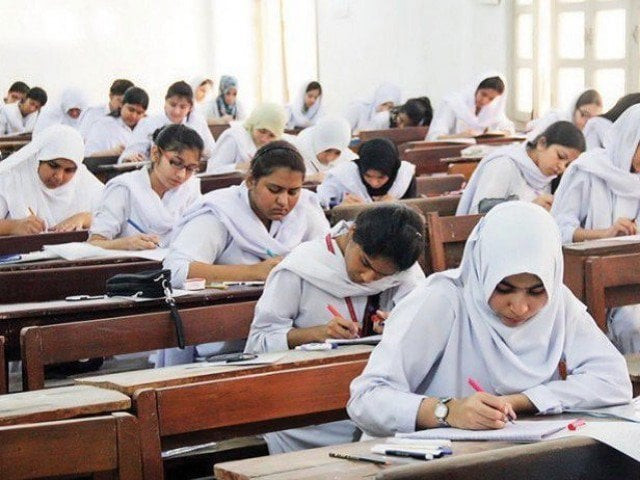Huge disconnect between teaching and exam methods, research finds
Questions are not formed to test students' skills for analysis, evaluation or creation

PHOTO: ONLINE/FILE
However, the correlation between the examination papers and the standards of teaching as well as the syllabus mostly omits this consideration. Dr Irfan Rind, an associate professor at Sukkur Institute of Business Administration (IBA) University and head of department of education, in his research has expatiated on the indispensability of this neglected correlation in his study. The research, titled 'Analyzing Impact of External Examination on Teaching and Learning of English,' was launched last week at Sukkur IBA.
"Despite their many benefits, public examinations are criticised for promoting examination-oriented pedagogies," he observed, citing the available research that educational institutions which have their performance and reputation associated with results, usually promote examination-oriented teaching practices.
In his research, Dr Rind assessed examination papers of English for Secondary School Certificate (SSC) Part-II and Higher Secondary Certificate (HSC) Part-II exams conducted by the Board of Intermediate and Secondary Education (BISE) Sukkur. The papers of 10 years from 2006 to 2016 were thoroughly reviewed to find out the nature of the questions.
Only 9% of Sindh’s teachers can teach math, science
Question papers
Based on the hierarchic model of classifying learning in six stages of knowledge; comprehension, application, analysis, evaluation and creation, the research evaluated that how many of these stages factor in the question papers. The first three stages are globally rated as low order learning and the last three as high order learning.
A grade-10 paper usually includes 15 multiple choice questions (MCQs), 12 constructed response questions (CRQs) and five extended response questions (ERQs). Similarly, a grade-12 paper would have 20 MCQs, 13 CRQs and four ERQs. The research found that 41% questions of SSC part-II pertained to knowledge, 42% to comprehension, and 17% to application. No question tested the students' skills for analysis, evaluation and creation which are part of the high order learning.
The findings from the HSC part-II examinations were also similar. Around 52% questions were related to comprehension, 29% to knowledge and 19% to application. The questions assessing the high order learning skills of the students were completely missing. Furthermore, the researcher also noticed frequent repetition of questions with 26% of them repeated without change, 13% with minor changes and 12% with significant changes in SSC part-II exams.
In the HSC part-II exams, the percentage was observed at 19%, 21% and 7%, respectively.
According to him, even the questions about poems were restricted to triggering only the cognitive abilities of knowledge and comprehension. Dr Rind gave example of a question asking the students to write a critical appreciation of the poems The Seven Ages of Man or The Lost Star. "Although phrases like 'critical appreciation' are used in some questions about poems in the papers, the way in which the question is posed doesn't trigger students' analytical skills," he contended.
"The questions simply just require students to recall events from the lessons, features of characters from novels, themes of the poems, quotations by the characters, usage of idioms in sentences, etc."
BISE officials
"The findings suggest that BISE Sukkur's examinations prioritise low order learning. Even the application-level questions are developed in a way that assess students' procedural knowledge instead of their application skills," underscored Dr Rind. According to him, the pattern of the question papers also goes against the standards of learning set down in the National Curriculum for English 2006.
The curriculum outlines five competencies including reading and thinking skills, writing skills, oral communication skills, formal and lexical aspects of language and appropriate ethical and social development.
The BISE Sukkur's officials, according to Dr Rind, blame the poor classroom education system to justify the paper setting based on low order learning.
They argue that the passing percentage of the students will dramatically fall if they introduced high order learning queries.
Withheld SAT results paint a dismal picture of Sindh’s education system
Teaching strategy
"The teachers' strategy centres around the 'important topics' or 'important titles' which are frequently repeated in the board exams," he noted. They help students memorise 'flexible' topics like Allama Iqbal, the national poet of Pakistan. "The material of this title can fit into many other titles like the national poet, favourite personality, role model, etc." The teachers even prepare guess-papers which contain questions which are most likely to appear in the examination and by doing so restrict the students from studying the whole book.
Open-book exams
The researcher has emphasised upon the importance of open-book assessment for testing the students' evaluative and creative skills. According to him, the BISE officials though do not deny significance of such exams, they point towards logistical problems as barriers for switching to this mode of examination. "The board gets deadlines from the provincial government to complete the paper checking within 90 days which are insufficient for the high order learning based answer papers." The boards also lack the expert assessors to prepare and check these papers.
Lack of coordination
The Board of Curriculum and Extension Wing (BCEW) designs the curriculum and the Sindh Text Book Board (STBB) publishes it. The schools function under Education and Literacy Department (ELD) while the examinations are conducted by BISEs. According to Dr Rind, BCEW, STBB, ELD and BISEs completely lack coordination which is very much required right from the stage of curriculum making to the exams. "Apparently, there is no official mode of communication among these departments."
Published in The Express Tribune, February 16th, 2019.



















COMMENTS
Comments are moderated and generally will be posted if they are on-topic and not abusive.
For more information, please see our Comments FAQ